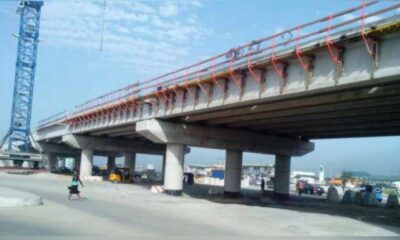Lagos State Governor, Mr. Babajide Sanwo-Olu, has commissioned the multimillion naira bus terminal at Oshodi that will also serve passengers using the Murtala Mohammed International Airport.
The Mafoluku Bus Terminal was built by the Lagos Metropolitan Area Transport Authority (LAMATA) in collaboration with the Federal Airports Authority of Nigeria (FAAN), operators of the airport.
The terminal is a gateway station that will serve Mafoluku, Oshodi, and Ajao Estate environs, providing bus connections primarily to Oshodi Transport Interchange, Ikeja Bus Terminal, Mile 2, and other parts of Lagos.
The Mafoluku Terminal will also provide a means of connection to the Murtala Muhammed International Airport (MMIA) and the domestic wing of the airport.
During the formal opening of the transport infrastructure, Sanwo-Olu said the project represented his Government’s objective of providing an integrated intermodal transport system through public and private investments under the Traffic Management and Transportation pillar of his administration’s T.H.E.M.E.S Agenda.
He said the State Government’s partnership with the Federal Government on the project was borne out of the need to ramp up transport infrastructure around international gateway areas, thereby providing a common place for commuters and commercial vehicles to meet.
“The bus terminal we are commissioning today is the outcome of the partnership between Lagos State and the Federal Government, represented by FAAN. The construction of bus terminals and shelters is a crucial aspect of our Bus Reform Initiative (BRI) through which we have delivered and commissioned a bus terminal in Oyingbo and launched Oshodi-Abule Bus Rapid Transit stations and corridor.
“Our collaboration with the Federal Government on this project is a solid example of public and public partnership and reiterates the importance of thinking outside the box to meet the needs of our citizens. I am delighted to officially open this purpose-built structure to serve commuters in the local and international airports community and adjoining communities. Route services will be run from this terminal to make it a hub for local and international travelers.”
Sanwo-Olu said both LAMATA and FAAN would be operating transportation franchises in and out of the Mafoluku terminal. While LAMATA will operate passenger bus services to Mile 2 and Oshodi, FAAN will run the local and international airports passenger services.
The Governor disclosed that more bus terminals would be delivered in the coming months in Agege, Ojota and Ajah under the first phase of the implementation of BRI, stressing that transport infrastructure was being complemented by Blue and Red metro lines to achieve integrated transport system in line with the strategic master plan of the State.
The Government, he said, will soon complete the BRT corridor of the Lagos-Badagry Expressway, while working to scale up infrastructure for bus corridors and two interchanges in Marina and Mile 2.
Sanwo-Olu said the recently launched First and Last Mile (FLM) Buses was the last layer of the BRI and designed to give private individuals an opportunity to invest in public transportation. This, he said, would solidify the State Government’s plan aimed at ensuring public transportation is moved from an unregulated framework to a regulated model.
He said: “In order to achieve a world-class transportation system in Lagos State, we have intensified efforts to deliver the first two of the six rail lines and one monorail captured in our Strategic Transport Master Plan (STMP), which are the Lagos Rail Mass Transit Red and Blue Lines. The journey to an integrated intermodal transport system is challenging but we are steadily moving towards our goal.”
Managing Director of FAAN, Captain Rabiu Yadudu, represented by Director of Finance, Mrs. Nike Aboderin, described the project commissioning as “a significant milestone” in partnership, noting that the terminal would provide organised distribution of passengers to and from international carriageways.
Managing Director of LAMATA, Mrs. Abimbola Akinajo, said the bus terminal was built on a land of 7,952 square meters, which was provided by FAAN. The edifice, she said, has a tarmac that can accommodate 27 high occupancy vehicles and a drop-off zone.
The terminal has facilities, including ticketing and sitting area, control room, cafeteria, public conveniences, commercial areas staff offices, ATM gallery and IT department.
Akinajo said the terminal also has a repair workshop area where buses would be maintained, in addition to fire equipment and traffic safety equipment.
She said: “The vision is to build functional and comfortable bus terminals that will provide the passengers an excellent travel experience as they either board or alight from buses. Commuters in these environs who used to go to the Ikeja Bus Terminal and the Oshodi Transport Interchange now have access to reliable and best-in-class transport services available at their doorsteps.”


 Forex2 weeks ago
Forex2 weeks ago


 Naira1 week ago
Naira1 week ago
 Naira4 weeks ago
Naira4 weeks ago
 Company News4 weeks ago
Company News4 weeks ago
 Billionaire Watch1 week ago
Billionaire Watch1 week ago




 Naira2 weeks ago
Naira2 weeks ago




 Naira1 week ago
Naira1 week ago




 Naira3 weeks ago
Naira3 weeks ago















